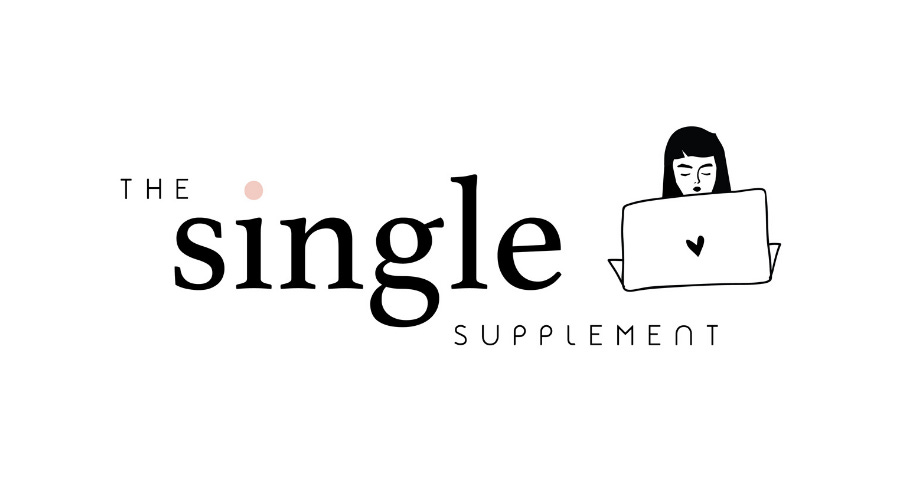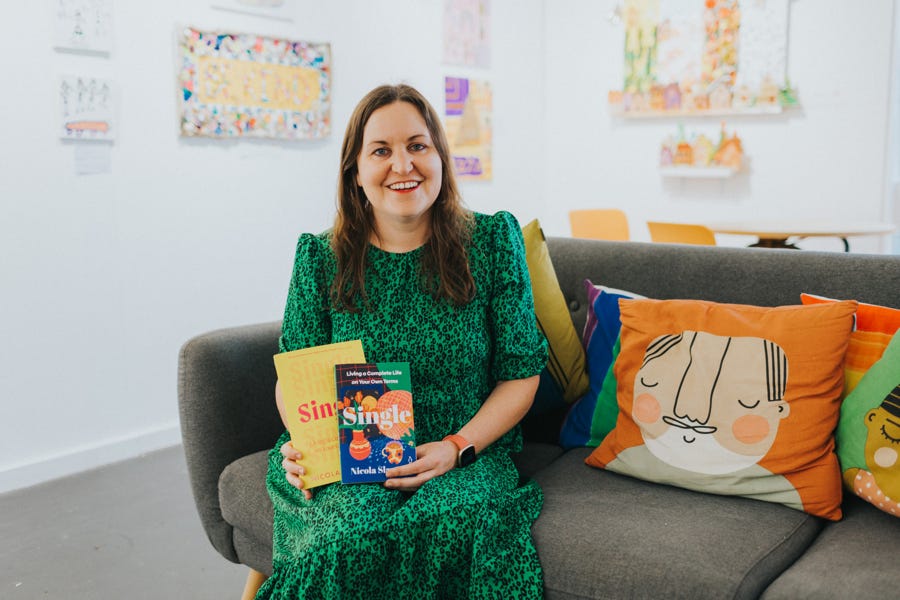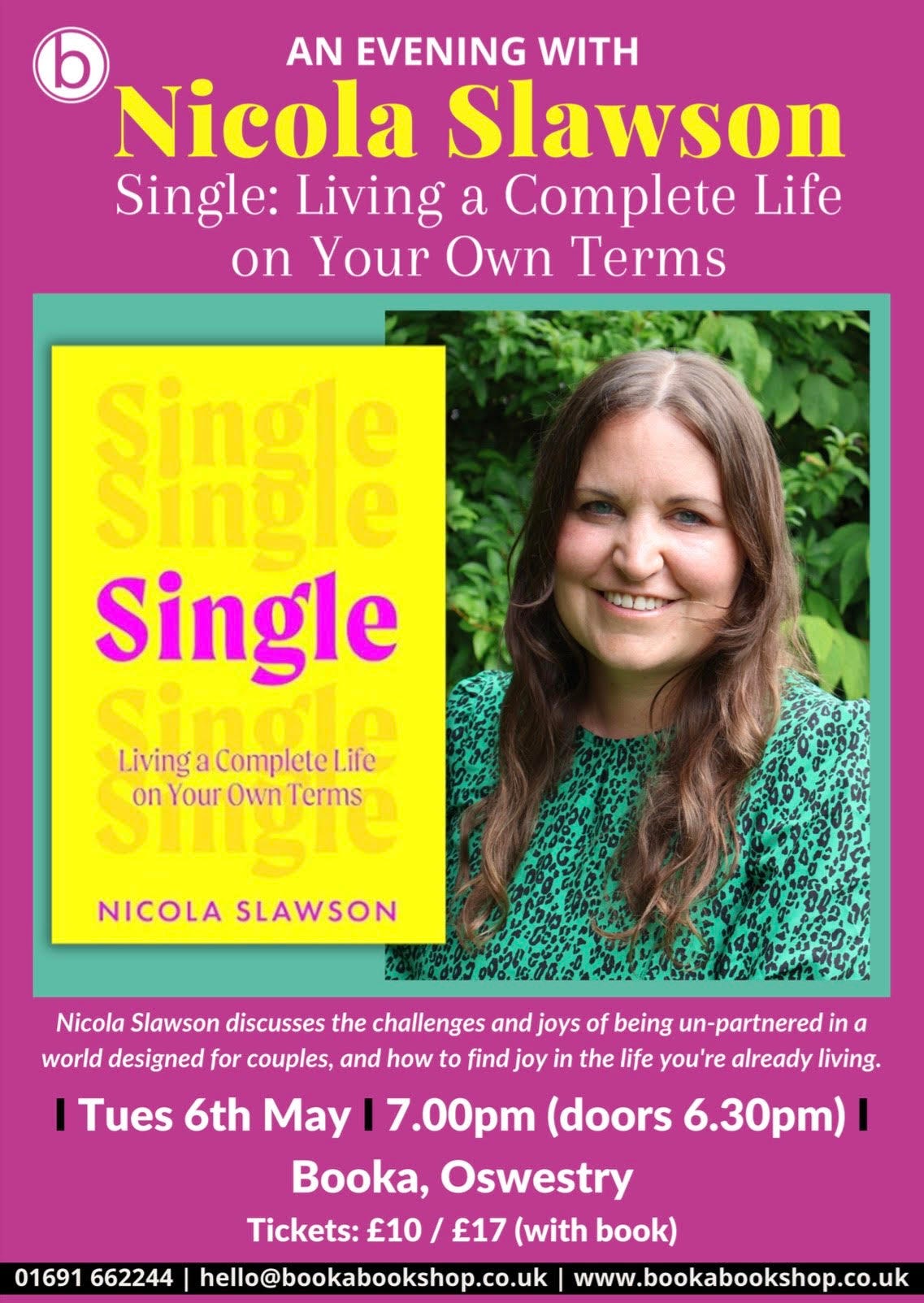This year, my closest friends and I have all been turning 40 and it’s making me feel all kinds of nostalgia for when we were young and spent all our time together. Sometimes this nostalgia has made me feel a kind of longing to go back and sometimes I can really appreciate where we are now.
The older you get, the more you naturally peel apart, whether that’s geographically or in terms of life changes such as marriage and children. This is something I discussed with Dr Alex George on his popular podcast The Stompcast, which I was recently a guest on. We talked about how in your 20s, everyone is always up for hanging out and going on holiday and doing fun spontaneous things but as you reach your 30s, things begin to shift and suddenly friends may have less time to do things. As I pointed out in the conversation we had, this can feel particularly hard if you are single – and especially if you live alone or live with housemates you don’t connect with.
As I was thinking about this, I was reminded of this essay by Tiffany Philippou, which she wrote for her brilliant newsletter Tough Love. She kindly gave me permission to republish on The Supp. In it, she explores her feelings of loneliness but also covers egg freezing, the isolation of getting injured when single and living alone, ageing and her thoughts on the film Substance. It’s a really vulnerable essay and I hope you’ll enjoy reading it. You can also read more of Tiffany’s wisdom in my book Single as she was one of my interviewees and you should sign up to her Substack!
Side note, welcome to all the new followers who found me through the Stompcast or through the other things I’ve been doing recently. It’s great to have you here. Scroll down for all my latest news and details the special event I’m doing soon! Hope to see some of you there!
Have a good week,
Nicola
Order my book Single here | Follow me on Instagram: @Nicola_Slawson
Why Am I Still Here?

By Tiffany Philippou
Last Halloween, as I stood in a long queue for The Rio cinema down Dalston’s Kingsland Road, I realised I was alone, while everyone else around me was not.
Usually, I’m a fan of my own company. I’ve travelled countless times alone and don’t hesitate when asking for a ‘table for one.’ I love going to the cinema alone. But this night was different —as the chattering of friends swam around me in that queue, I hated that I was by myself.
I didn’t have anyone to bring with me that night. Halloween has become one of those times like New Year’s Eve and Valentine’s when it becomes glaringly obvious that your life is out of step with those around you. My friends with children were out trick-or-treating and Halloween parties were happening—but I wasn’t invited to them. I exist in limbo —standing among the young people but no longer one of them. Two girls behind me were discussing smuggling in alcohol from the off-license.
Once I made it to my seat, time stood still as the chatter of friends jabbed into my loneliness. I felt awkward while knowing that no one was paying me any attention —self-conscious and invisible all at once.
I was jealous. In my twenties, I had so many friends around me all the time that I didn’t even go to the supermarket alone. We all occupied close corners of East London. Since then, people have been peeling further and further away and I’m asking —Why am I still here?
The pang of nostalgia I felt for my youth was apt because the film I was about to watch was a horror about a woman desperate to experience the joys of youth again through something called The Substance.
The Substance promises a woman in her fifties, Elisabeth Sparkle, played by Demi Moore, a ‘A new, younger, more beautiful, more perfect, you.’ After bouts of loneliness and being ignored, the faded star injects herself with The Substance.
While watching this film, I was in the middle of my own process of injecting myself to freeze time. My substance was a cocktail of hormones so I could artificially create eggs to extract a part of myself and put it on hold.
The egg freezing process, like Sparkle’s The Substance, is an undignified experience. At one point she crawls under a half-open garage door to get her hit. While the waiting room at the egg freezing clinic has a nicer aesthetic, they’ll throw a random invoice at you that you weren’t expecting on your way out. I’ve stood there, embarrassed, transferring money between accounts so I can pay it.
Egg freezing is an assault on your finances and your body. Every part of it felt like punishment for all the poor financial decisions and bad boyfriends that had brought me to this point. Most cruelly, it made me more sensitive about my age. This isn’t helped when I meet guys a few years younger than me and they say they like an older woman. I look around the room before I realise they’re talking about me.
So much of the attractiveness of youth is tied to symbols of fertility. The young version of Demi Moore after she takes The Substance, Sue, is played by the pouty-lipped, Margaret Qualley who has a voluptuous bottom and long hair. Sue is showered with adoration and an abundance of opportunity —it’s a stark contrast to the increasing loneliness that couples Demi’s character’s ageing.
At no point in the film did I not understand Demi’s character’s desire to inject herself with the hope of a better version of herself and a better life. Throughout the film, I got it. Relics of a time when she was famous are hung around her apartment. She wants some of her glory back. While the consequences of Sparkle’s decisions become increasingly vile and grotesque, right up until the end, I always, always get it. She’s driven by a desire to belong. Something that’s so ingrained into the depths of our bodies, and we’ve been told, as women, that the connection we crave will come from how we look.
Demi’s desire isn’t trivial. If we felt loved, adored and relevant, we wouldn’t feel sad and alone and obsess over how we can paper over the cracks of time on our faces.
Not long before I saw The Substance, I felt connected to Sparkle’s sadness. In the months preceding this cinema trip, I hit my head and suffered a concussion. What followed were months of existing close to hell. My life was a series of headaches, nausea and emotional dysregulation. I couldn’t work for the first few weeks. I had no partner to financially fall back on or make me a cup of tea. No company with sick pay. The buck stopped with me and I had to keep going —it was a huge burden to shoulder alone and the pressure sunk me. The medical advice included not to be stressed or think too much. I couldn’t even watch TV. Time moves incredibly slowly if you can’t use your brain without feeling sick. It was one of the most lonely and isolating times in my life.
One day, the concussion lifted and I bounced back, but it will never leave me. I can’t shake the feeling about the state of my life. In contrast, fifteen years ago, when I had a far more serious accident and bang to the head, I was surrounded by friends. I had a partner and I recovered quickly. The concussion, like egg freezing, made me aware of my age, my life stage, and the loneliness that can come with it.
Of course, I’m neither old nor truly alone. Life is fragile and each day is a gift. My friend died, a sharp reminder that I’m not old at all. To die at this age is a great tragedy. His memorial, held the day after my egg collection, was a presentation that the only legacy we leave behind is our loved ones.
As The Substance ended, the room erupted with applause. I’d had a great time because I hadn’t watched it alone, but in a room of hundreds of people gasping in shock and laughing in horror. This had been a community event in a place like no other. A friend texted to say they’re moving to Dalston. And I understood, as the lights came up in the dusty red room at The Rio, that my Halloween night out in this unique space, is why I’m still here.
Tiffany Philippou, a writer in her late thirties based in East London, and her Substack, which is called Tough Love, is where she tries to make sense of this thing we call life. Expect stories about love, loss, loneliness, identity, shame, and all the uncomfortable questions we often think should stay inside our heads. Life is beautiful, and life is hard. Tiffany try to be brave enough to say the things most people don’t and give a voice to the unspoken. Sign up here.
Single (the book) news
My book has been out in the world for two months now and I can’t believe it. It’s been such a wild ride of emotions since it came out and I am going to write more about that soon. I’ve had some amazing reviews on Amazon and loads of lovely messages from readers on social media too. I would love to hear from you if you have read the book! How did it make you feel? What part resonated the most? You can comment below or send me an email by replying to this newsletter.
For those who haven’t got their copy yet, if you’re in the UK, you can buy a signed copy from Booka here. If you are in the US, I’m very excited that Single is on sale at lots of independent bookshops so do check your local one and it’s also being shipped out nationally by the famous Powell’s. You can also buy the book on Amazon here in the UK and here in the US. Don’t forget you can buy it as an ebook or as an audiobook.
Here’s the latest news on my book:
If you live in Shropshire or nearby, I’m going to be doing my first bookshop event at the Booka bookshop in Oswestry on Tuesday 6th May and I’d love to see you there! It will be a chat about the themes I explore in Single with a host followed by audience Q&A. Tickets are available here.
I was a guest on The Guardian’s Today in Focus podcast talking all about my journey to becoming a mum and how coparenting is going with my friend. You can hear my baby in the background – and Tom even shares his thoughts too. You can listen here.
The same week I recorded that podcast, I was also a guest on The Stompcast, which is Dr Alex George’s very popular podcast. We had such a great conversation and he asked such thoughtful questions. The episodes are in three parts and designed to be listened to while you go out for a walk (we were even walking while recording!). You can listen to the first one here, the second here and the third here or wherever you listen to podcasts. Heres’s a snippet:
I wrote a feature for Grazia magazine all about how being single can impact your career and how I think it’s the new glass ceiling that can sometimes stop you from taking career risks or launching businesses (because you have no financial support to fall back on at home). Have a read here.
I was reviewed by The Library Journal in the US and it was a lovely one. You can read the full review here but this was their verdict:
Fans of Shani Silver’s A Single Revolution and Kate Bolick’s Spinster will find comfort and community in this new addition to the growing body of work on what it means to be unpartnered within systems and structures designed for couples. It’s a beautiful resource for people navigating their own singleness and a call to action for all readers to uncouple their stereotyped preconceptions from the reality of what fulfilled lives can look like.
One for any aspiring writers or journalists – I was a guest on the London Writer’s Salon podcast. I talked about my journey into journalism, how and why I launched this newsletter and how I then got a book deal. I also talk about how networking doesn’t have to be cringe, how to pitch and build relationships with editors and what I would do differently if I could write my book again. You can listen here or wherever you listen to podcasts.
About Nicola
Nicola Slawson is passionate about telling human stories – either other people's or her own – and is a freelance journalist, writer and public speaker based in Shropshire in the UK. The Single Supplement is an award-winning newsletter on Substack, especially for single people. Her debut book Single is out now and here are the links to buy it. Follow Nicola on Instagram.
Did someone forward The Single Supplement to you? Sign up here.






